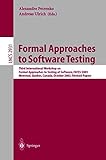Formal Approaches to Software Testing [electronic resource] : Third International Workshop on Formal Approaches to Testing of Software, FATES 2003, Montreal, Quebec, Canada, October 6th, 2003. Revised Papers / edited by Alexandre Petrenko, Andreas Ulrich.
Material type: TextSeries: Lecture Notes in Computer Science ; 2931Publisher: Berlin, Heidelberg : Springer Berlin Heidelberg, 2004Description: VIII, 268 p. online resourceContent type: text Media type: computer Carrier type: online resourceISBN: 9783540246176Subject(s): Computer science | Software engineering | Logic design | Computer Science | Software Engineering | Programming Languages, Compilers, Interpreters | Logics and Meanings of ProgramsAdditional physical formats: Printed edition:: No titleDDC classification: 005.1 LOC classification: QA76.758Online resources: Click here to access online
TextSeries: Lecture Notes in Computer Science ; 2931Publisher: Berlin, Heidelberg : Springer Berlin Heidelberg, 2004Description: VIII, 268 p. online resourceContent type: text Media type: computer Carrier type: online resourceISBN: 9783540246176Subject(s): Computer science | Software engineering | Logic design | Computer Science | Software Engineering | Programming Languages, Compilers, Interpreters | Logics and Meanings of ProgramsAdditional physical formats: Printed edition:: No titleDDC classification: 005.1 LOC classification: QA76.758Online resources: Click here to access online  E-BOOKS
E-BOOKS
| Current library | Home library | Call number | Materials specified | URL | Status | Date due | Barcode |
|---|---|---|---|---|---|---|---|
| IMSc Library | IMSc Library | Link to resource | Available | EBK3074 |
Program Testing and Analysis -- Black-Box Testing of Grey-Box Behavior -- On Checking Whether a Predicate Definitely Holds -- Using a Software Testing Technique to Improve Theorem Proving -- Auto-generating Test Sequences Using Model Checkers: A Case Study -- Mutually Enhancing Test Generation and Specification Inference -- JMLAutoTest: A Novel Automated Testing Framework Based on JML and JUnit -- Test Theory and Test Derivation Algorithms -- Compositional Testing with ioco -- Defining Observation Objectives for Reactive and Distributed Systems -- Time-Optimal Real-Time Test Case Generation Using Uppaal -- Test Cases Generation for Nondeterministic Real-Time Systems -- Property Oriented Test Case Generation -- Computing Unique Input/Output Sequences Using Genetic Algorithms -- Automatic Generation of Test Purposes for Testing Distributed Systems -- Test Methods and Test Tools -- Interaction Testing in an Embedded System Using Hardware Fault Injection and Program Mutation -- Automatic Conformance Testing of Internet Applications -- A Use Case Driven Testing Process: Towards a Formal Approach Based on UML Collaboration Diagrams -- VISWAS and on Diagnosability with IEEE Std P1522 and UML2.0 Testing Profile -- Towards a Tool Environment for Model-Based Testing with AsmL.
Formal methods provide system designers with the possibility to analyze system models and reason about them with mathematical precision and rigor. The use of formal methods is not restricted to the early development phases of a system, though. The di?erent testing phases can also bene?t from them to ease the p- duction and application of e?ective and e?cient tests. Many still regard formal methods and testing as an odd combination. Formal methods traditionally aim at verifying and proving correctness (a typical academic activity), while testing shows only the presence of errors (this is what practitioners do). Nonetheless, there is an increasing interest in the use of formal methods in software testing. It is expected that formal approaches are about to make a major impact on eme- ing testing technologies and practices. Testing proves to be a good starting point for introducing formal methods in the software development process. This volume contains the papers presented at the 3rd Workshop on Formal Approaches to Testing of Software, FATES 2003, that was in a?liation with the IEEE/ACM Conference on Automated Software Engineering (ASE 2003). This year, FATES received 43 submissions. Each submission was reviewed by at least three independent reviewers from the program committee with the help of - ditional reviewers. Based on their evaluations, 18 papers submitted by authors from 13 di?erent countries were selected for presentation at the workshop.


There are no comments on this title.